Related Research Articles

Duke of Marlborough is a title in the Peerage of England. It was created by Queen Anne in 1702 for John Churchill, 1st Earl of Marlborough (1650–1722), the noted military leader. In historical texts, unqualified use of the title typically refers to the 1st Duke. The name of the dukedom refers to Marlborough in Wiltshire.
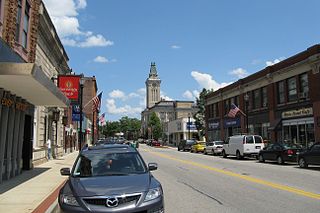
Marlborough is a city in Middlesex County, Massachusetts, United States. The population was 41,793 at the 2020 census. Marlborough became a prosperous industrial town in the 19th century and made the transition to high technology industry in the late 20th century after the construction of the Massachusetts Turnpike.

General John Churchill, 1st Duke of Marlborough, 1st Prince of Mindelheim, 1st Count of Nellenburg, Prince of the Holy Roman Empire, was an English soldier and statesman whose career spanned the reigns of five monarchs. From a gentry family, he served first as a page at the court of the House of Stuart under James, Duke of York, through the 1670s and early 1680s, earning military and political advancement through his courage and diplomatic skill.
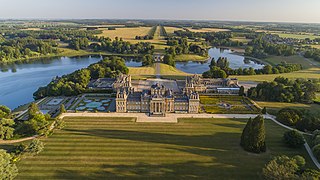
Blenheim Palace is a country house in Woodstock, Oxfordshire, England. It is the seat of the Dukes of Marlborough and the only non-royal, non-episcopal country house in England to hold the title of palace. The palace, one of England's largest houses, was built between 1705 and 1722, and designated a UNESCO World Heritage Site in 1987.

Sarah Churchill, Duchess of Marlborough, Princess of Mindelheim, Countess of Nellenburg, was an English courtier who rose to be one of the most influential women of her time through her close relationship with Anne, Queen of Great Britain. Sarah's relationship and influence with Princess Anne were widely known, and leading public figures often turned their attentions to her, hoping for favor from Anne. By the time Anne became queen, Sarah’s knowledge of government and intimacy with the queen had made her a powerful friend and a dangerous enemy.
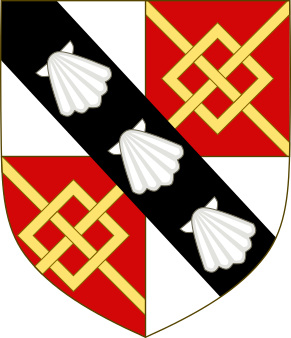
The Spencer family is an aristocratic family in the United Kingdom. Founded in the 15th century, it has spawned numerous aristocratic titles including the dukedom of Marlborough, the earldoms of Sunderland and Spencer, and the Churchill barony. Two prominent members of the family during the 20th century were Sir Winston Churchill and Diana, Princess of Wales.

Charles Richard John Spencer-Churchill, 9th Duke of Marlborough,, styled Earl of Sunderland until 1883 and Marquess of Blandford between 1883 and 1892, was a British soldier and Conservative politician, and a close friend of his first cousin Winston Churchill. He was often known as "Sunny" Marlborough after his courtesy title of Earl of Sunderland.

John Winston Spencer-Churchill, 7th Duke of Marlborough, styled Earl of Sunderland from 1822 to 1840 and Marquess of Blandford from 1840 to 1857, was a British Conservative cabinet minister, politician, peer, and nobleman. He was the paternal grandfather of Prime Minister Sir Winston Churchill.

John George Vanderbilt Henry Spencer-Churchill, 11th Duke of Marlborough, was a British peer. He was the elder son of the 10th Duke of Marlborough and his wife, the Hon. Alexandra Mary Hilda Cadogan. He was known as "Sunny" after his courtesy title of Earl of Sunderland.

Marlborough is a market town and civil parish in the English county of Wiltshire on the Old Bath Road, the old main road from London to Bath. The town is on the River Kennet, 24 miles (39 km) north of Salisbury and 10 miles (16 km) southeast of Swindon.
John Bird may refer to:
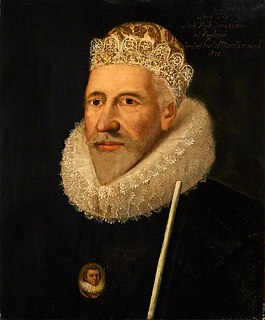
James Ley, 1st Earl of Marlborough was an English judge and politician who sat in the House of Commons at various times between 1597 and 1622. He was Lord Chief Justice of the King's Bench in Ireland and then in England and was Lord High Treasurer from 1624 to 1628. On 31 December 1624, James I created him Baron Ley, of Ley in the County of Devon, and on 5 February 1626, Charles I created him Earl of Marlborough. Both titles became extinct upon the death of the 4th Earl of Marlborough in 1679.

Henrietta Godolphin, 2nd Duchess of Marlborough was the daughter of John Churchill, 1st Duke of Marlborough, general of the army, and Sarah Jennings, Duchess of Marlborough, close friend and business manager of Queen Anne.
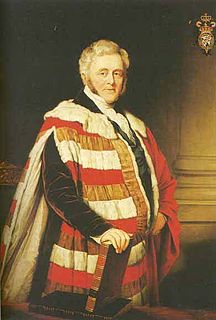
George Spencer-Churchill, 6th Duke of Marlborough, DCL, styled Earl of Sunderland until 1817 and Marquess of Blandford between 1817 and 1840, was a British nobleman, politician, and peer. The great-grandfather of Sir Winston Churchill, he served as Lord-Lieutenant of Oxfordshire between 1842 and 1857.

The first Parliament of the Kingdom of Great Britain was established in 1707 after the merger of the Kingdom of England and the Kingdom of Scotland. It was in fact the 4th and last session of the 2nd Parliament of Queen Anne suitably renamed: no fresh elections were held in England, and the existing members of the House of Commons of England sat as members of the new House of Commons of Great Britain. In Scotland, prior to the union coming into effect, the Scottish Parliament appointed sixteen peers and 45 Members of Parliaments to join their English counterparts at Westminster.
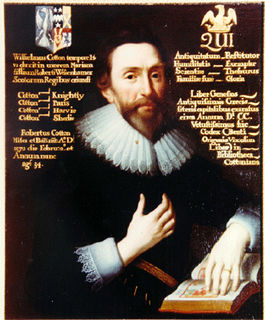
There have been three Baronetcies created for persons with the surname Cotton, all in the Baronetage of England. One creation is extant as of 2008.
Waimea was a parliamentary electorate in the Nelson Province of New Zealand, from 1853 to 1887. Initially represented by two members, it was a single-member electorate from 1861.

The 1705 English general election saw contests in 110 constituencies in England and Wales, roughly 41% of the total. The election was fiercely fought, with mob violence and cries of "Church in Danger" occurring in several boroughs. During the previous session of Parliament the Tories had become increasingly unpopular, and their position was therefore somewhat weakened by the election, particularly by the Tackers controversy. Due to the uncertain loyalty of a group of 'moderate' Tories led by Robert Harley, the parties were roughly balanced in the House of Commons following the election, encouraging the Whigs to demand a greater share in the government led by Marlborough
Sir John Pauncefoot was the member of Parliament for the constituency of Gloucestershire for the parliaments of May 1413 and December 1421.
References
- ↑ BIRD, John (d.c.1445), of Marlborough, Wilts. The History of Parliament. Retrieved 7 December 2018.